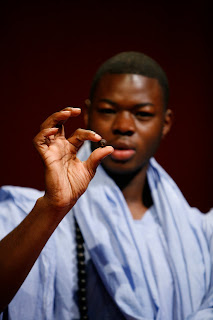 Written for Culture Wars
Written for Culture WarsEmo Philips tells a great joke about religion, in which he encounters a suicidal man with his toe’s curled over the edge of a bridge. “Do you believe in God?” he asks.
“Yes,” comes the reply.
“Are you a Christian or a Jew?”
“A Christian.”
“Me too. Protestant or Catholic?”
Again the reply is affirmative. The enquiry continues, discovering more and more shared beliefs. “What franchise?” Baptist. “Me too!”
Northern Baptist or Southern Baptist?” Northern Baptist. “Me too! Northern Conservative Baptist or Northern Liberal Baptist?” Northern Conservative. “Me too! Northern Conservative Baptist Great Lakes Region or Northern Conservative Baptist Eastern Region?” Northern Conservative Baptist Great Lakes Region “Me too!”
Northern Conservative Baptist Great Lakes Region Council of 1879 or Northern Conservative Baptist Great Lakes Region Council of 1912?”
“Northern Conservative Baptist Great Lakes Region Coucil of 1912”
“Die heretic!” Philips cries, shoving him over the edge.
Peter Brook’s latest covers the exact same territory, albeit wearing a more sombre, sober expression to do so. It latches onto a particular dispute in Islamic practice, stemming from a single moment of uncertain ambiguity, as to whether a particular prayer should be recited 11 or 12 times. Leading the two factions are two spiritual sages, Tierno Bokar and Cherif Hamallah, each of whom preaches tolerance as an absolute principal.
Truth be told, the concrete intricacies of the plot are tricky. To follow fully the hierarchies and political position of French colonials and African natives requires a patient ear and sturdy unfaltering concentration. However, I found the particularities of less import than the abstract archetypes underpinning them. To exert too much effort into the narrative is almost to lose sight of the pointed philosophy beneath. The preaching, in other words, has more resonance than the preachers.
On this level, 11 & 12 pulsates with pluralism. There are, we are told, three truths: yours, mine and the ineffable, objective truth of which the first two are but hazy refractions. It tackles the problem of others, the unbridgeable gap between each of us that leads to inevitable misunderstandings and the impossibility of true communication. Not that this excuses one from the attempt to do so or the duty to hold fast to one’s own beliefs on the grounds of shrugging subjectivism. The snake, we are told, need not bite to stand his ground. When provoked, it need only hiss.
The result is a purification ritual, utterly meditative and centring. It removes you from yourself for the duration, but, by the time is releases its grip, the world you re-enter is altered. Somehow calmer and more grounded. You really feel your place within it, small but integral, one amongst many.
All this, Brook achieves with a staging that values what is said over the act of saying it. In fact, to see Brook’s work firsthand – perhaps it is more accurate to say his work now, aged 84 – is to see the way in which his theory has been manhandled and misrepresented. We have taken the idea of Brook and added make-up. We have glammed it up with thea-tricks. We have become too clever by half and taken his name in vanity.
Here, though, there is no urge to dazzle or embellish. Instead, his actors move slowly and speak softly. For the most part, they sit and listen, drawing us in without demanding to be heard. Far from the haze-filled void that has come to stand for the empty space, Brook’s stage is here a walled floor. His scenic choices as little as repositioning barren tree-trunks to break up the space. There is, quite simply, a (surprising) trust in the text and a confident, composed certainty behind its delivery. Why seek to do more than is necessary?
Now I’d be the last to throw flair and invention into the wings, but there is something vastly humbling about 11 & 12 purity. It is as if it has thrown off earthly possessions or chosen to fast and sought a meaningful alternative. That may draw accusations of boredom and neglect for its audience – and one does begin to feel its length towards the end – but in actual fact it does us a great service. It offers an ethical code, rigorously and vigourous spelt out, and provides the space in time in which to digest it.
Photocredit: Pascal Victor, ArtComArt
0 comments:
Post a Comment